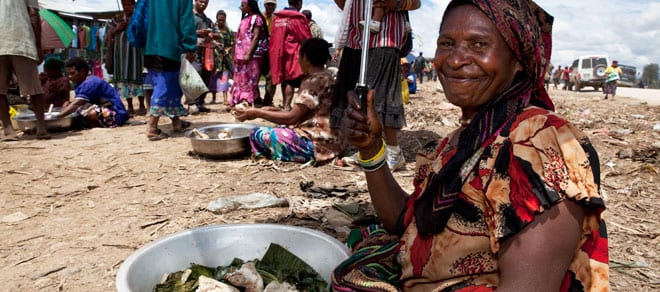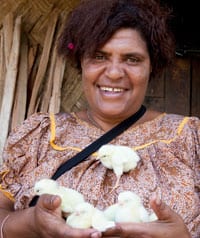Oxfam and its partner Hela Rural Women’s Development Foundation (HRWDF) are equipping women in Tari with the tools to support themselves and their children financially. Women have always been the backbone of the family in Huli culture, but new sources of income and a growing sense of financial awareness are building their self-esteem, and enabling them to contribute to the development of their families and communities independently from their husbands.

Oxfam and its partner Hela Rural Women’s Development Foundation (HRWDF) are equipping women in Tari with the tools to support themselves and their children financially.
Women have always been the backbone of the family in Huli culture, but new sources of income and a growing sense of financial awareness are building their self-esteem, and enabling them to contribute to the development of their families and communities independently from their husbands.
This economic justice is a huge turning point in a society where men have often controlled women’s finances, and spent their wives’ money on things for themselves instead of their families.
Small-scale business for secure livelihoods
A K42,000 (NZ$25,133) grant from Oxfam has mobilised a group of entrepreneurial women in Hela province to set up a range of small-scale businesses. Around 30 women have ventured into chicken farming, selling second-hand clothes, digicell phonecard sales and an ice block business.
Oxfam has given HRWDF the grant to buy chicks, feed and equipment for the various small-scale business projects, including a refrigerator for the ice block scheme. HRWDF’s role is to train the women to write business plans and manage their ventures, supporting them in running their start-ups.
 |
| Each chick the women are given costs $1, paid for by Oxfam. Once reared, the chickens will be sold on for eating, giving the women a much-needed source of income. |
Chickens
One popular scheme has been rearing chickens. People rarely had access to chicken meat in the past – local hens were used for eggs and not of good enough quality to eat.
HRWDF give women a box of day old chicks, paid for by Oxfam, that have been transported from Madang on the North coast. The chickens are then reared using the K1,020 worth of feed (also provided by Oxfam), and at eight weeks old they are sold as broilers for local people to eat. The popularity of the meat means the women are guaranteed an income and that family diets are improved by an increase in protein, which is in short supply.
There are plans to expand the scheme by helping the women raise the chickens so that they can breed. This will mean there is no need to import the chicks, increasing the profits that can be spent on their families.
Microfinance
The projects are financed through a lending scheme. Each of the women gets a rotating loan of K1000 ($598), which is passed onto another women once they have paid it back, in addition to putting in K200 ($120) into a pool to build up the Foundation.
Empowering for essentials
The income generated by these schemes is used by the women to buy clothing, food and medicines for themselves and their children, and to pay for school fees.
A finance officer is helping the women to save money in their new personal accounts, and only the women can withdraw money, which they have to sign for. This prevents their husbands from accessing their accounts because experience has shown they will often squander their wives’ money on themselves, especially on alcohol, or in paying clan debts and compensation repayments.
This restriction applies to all the projects HRWDF run. One of the women working with HRWDF is married to the local police chief, and he makes sure that the husbands respect this rule and the women involved in the programme are safe.
The women of Tari are admired and respected in the community, not only for the service they provide, but for the way in which they have independently earned their own money. The women are even lobbying their MP to build a proper market building for their products.
They are inspiring other women to earn an income for themselves.
Click on the images below to see HRWDF securing livelihoods with chicks.
 Buy a flock of chicks with Oxfam Unwrapped, and help women in Papua New Guinea support themselves and their families.
Buy a flock of chicks with Oxfam Unwrapped, and help women in Papua New Guinea support themselves and their families.




